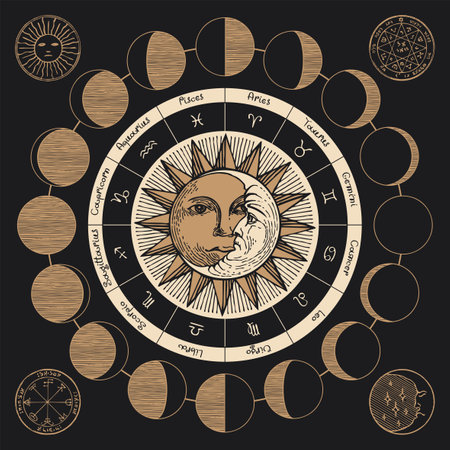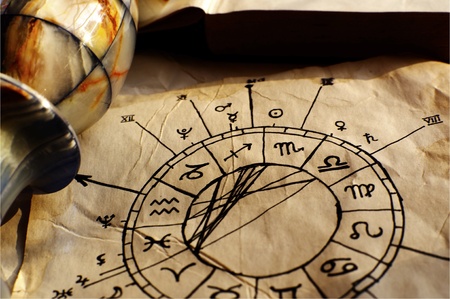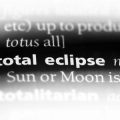Introduction: The Fascination with Star Signs in the UK
Walk into any British office on a Monday morning and you’re likely to overhear snippets of conversation about weekend horoscopes or jokes about colleagues’ star signs. In the UK, astrology has long held a curious place in popular culture, often woven into daily routines and workplace banter. Whether it’s reading horoscopes in the Metro during a commute or playfully blaming Mercury retrograde for technological hiccups, many Brits enjoy discussing star signs—sometimes seriously, sometimes with a knowing wink. This fascination isn’t just confined to social gatherings; it seeps into professional life too, where stereotypes about certain zodiac signs can shape perceptions, fuel friendly rivalries, and even influence team dynamics. But how much truth is there behind these astrological labels? In this article, we’ll explore the prevalence of star sign stereotypes in the British workplace and question whether they reflect reality or are simply light-hearted myths passed around over tea breaks.
2. Most Popular Star Sign Stereotypes at Work
When it comes to the British workplace, star sign stereotypes are a favourite topic for a bit of light-hearted “office natter.” Whether you’re huddled around the kettle or grabbing a cheeky biscuit during your tea break, talk of astrology often creeps in—sometimes with a raised eyebrow and sometimes in earnest. Let’s take a closer look at how each star sign is perceived by colleagues across UK offices, using classic British expressions and everyday banter.
| Star Sign | Stereotypical Traits (UK Workplace) | Common Banter/References |
|---|---|---|
| Aries | Bullish go-getters, always “first past the post,” can be a bit gobby in meetings. | “Typical Aries, always charging ahead!” |
| Taurus | Stubborn as a mule but reliable; loves their creature comforts—never skips the tea round. | “You can’t move a Taurus once they’ve dug their heels in.” |
| Gemini | The office chatterbox; “can’t sit still for five minutes,” always has the latest gossip. | “Geminis—two-faced or just twice as chatty?” |
| Cancer | The team’s unofficial agony aunt/uncle; sensitive, nurturing, brings in homemade bakes. | “If you need a shoulder to cry on, find the Cancer.” |
| Leo | Loves being centre stage; thrives on praise; “big on bravado, never short on confidence.” | “Classic Leo—always after Employee of the Month!” |
| Virgo | The perfectionist; notices every detail, keeps the stationery cupboard immaculate. | “Virgos—spot a typo from ten paces away.” |
| Libra | The diplomat; hates confrontation, smooths over office spats with charm and wit. | “If there’s drama brewing, Libra will have it sorted by lunch.” |
| Scorpio | Mysterious and intense; “plays cards close to chest,” great at keeping secrets. | “Never cross a Scorpio—they remember everything!” |
| Sagittarius | The joker; adventurous, always booking holidays and telling tall tales from weekends away. | “Sagittarius—already planning Friday night on Monday morning.” |
| Capricorn | The grafter; ambitious, straight-talking, first in and last out of the office. | “Capricorn—lives for spreadsheets and overtime.” |
| Aquarius | The quirky innovator; “offbeat ideas,” tech-savvy, slightly aloof but friendly enough. | “Aquarius will suggest something mad in every meeting.” |
| Pisces | The dreamer; creative soul, sometimes away with the fairies but brings fresh perspective. | “Pisces—probably doodling instead of taking notes again.” |
This playful categorisation is all part of typical British humour—rarely taken too seriously but always good for an icebreaker or two. While these stereotypes pop up in office conversations, they offer a window into how personality types are perceived and gently poked fun at within UK professional culture.

3. Myth-Busting: What Science (and HR) Actually Say
When it comes to astrology and star sign stereotypes in the British workplace, it’s important to separate fact from fiction. Scientific studies consistently show that there is no empirical evidence linking a person’s star sign to their work performance or personality traits. In fact, research published by the British Psychological Society suggests that factors such as upbringing, environment, and individual experience play a far greater role in shaping who we are at work than the position of the stars at our birth.
From a Human Resources perspective, most UK companies take a pragmatic approach. HR professionals focus on validated personality assessments like the Myers-Briggs Type Indicator or the Big Five Personality Traits to understand team dynamics and individual strengths. These tools are grounded in psychology and provide actionable insights for recruitment and team building. While some employees may enjoy reading their horoscopes for fun, it’s widely understood that making hiring or promotion decisions based on astrology would be both unprofessional and potentially discriminatory.
In practice, British workplaces prioritise fairness, inclusivity, and evidence-based decision-making. This means that while you might overhear light-hearted banter about “typical Geminis” or “stubborn Taureans” over a cuppa in the staff kitchen, these stereotypes rarely influence official workplace policies or practices. Instead, companies invest in training managers to recognise unconscious bias and to value individuals for their unique skills and contributions—regardless of their birthday.
4. Real Talk: Workplace Stories and Experiences
When it comes to star signs, the British workplace is a treasure trove of banter and playful teasing. Many UK employees have stories about how their zodiac signs have shaped interactions with colleagues—sometimes leading to a good laugh, sometimes sparking a bit of friction. Let’s explore some real-life anecdotes that highlight both the light-hearted and occasionally awkward sides of astrology at work.
The Light Side: Friendly Banter Over Tea
For many, conversations about star signs are simply part of the social fabric at work. It’s not uncommon to hear, “You’re such a typical Virgo!” during a tea break or for someone to be gently ribbed for being “predictably dramatic” if they’re a Leo. These moments can foster camaraderie and help people bond over shared (or clashing) traits. Here’s a snapshot of common scenarios:
| Scenario | Star Sign Involved | Typical Banter |
|---|---|---|
| Meticulous desk arrangement | Virgo | “That’s Virgo energy right there!” |
| Lively debate in meetings | Gemini | “Leave it to Gemini to play devil’s advocate.” |
| Birthday celebrations with flair | Leo | “Trust a Leo to love the spotlight!” |
The Friction: When Stereotypes Go Too Far
While most star sign chat is harmless fun, some employees report feeling pigeonholed or even excluded based on astrological stereotypes. For example, one London-based Cancer sign shared how they felt dismissed as “overly sensitive” whenever workplace tensions arose, while an Aries colleague found themselves labelled “bossy” in team projects. This kind of stereotyping can sometimes undermine professional relationships or make people feel misunderstood.
Anecdotes from the British Workplace
- A Manchester marketing executive recalls her team jokingly blaming every office miscommunication on Mercury retrograde—a running joke that became an icebreaker during stressful campaigns.
- A Bristol finance manager noticed that colleagues would avoid assigning detail-oriented tasks to Pisces team members, assuming they’d be too ‘dreamy’ to manage the numbers—despite evidence to the contrary.
Reflection: Balancing Fun with Sensitivity
Overall, astrology-inspired banter can add humour and colour to the UK workplace. However, it’s important for teams to check in with each other and ensure that jokes don’t cross into territory where they cause discomfort or exclusion. Using zodiac stereotypes thoughtfully—while recognising individual differences—can help maintain a supportive and inclusive environment where everyone feels valued beyond their star sign.
5. Navigating Star Sign Stereotypes: A Practical Guide
Whether you’re an Aries accused of being “too bossy” or a Pisces teased for daydreaming, star sign stereotypes can crop up in British workplaces more often than you might expect. These comments are usually meant in good humour, but they can sometimes feel awkward or even exclusionary. Here’s how to handle astrological banter with both British wit and professionalism, while keeping the workplace inclusive for everyone.
Keep It Light—But Respectful
Banter is part of British office culture, and astrology jokes are often just another way colleagues bond over a cuppa. If someone makes a comment about your star sign, it’s perfectly fine to laugh along—provided you’re comfortable. Responding with gentle humour, such as, “Maybe my Virgo side is showing!” can diffuse tension and show you’re not taking things too seriously. However, if the jokes become repetitive or veer into uncomfortable territory, don’t hesitate to set polite boundaries.
Set Boundaries with Tact
If a colleague’s comments about your star sign feel intrusive or persistent, it’s important to speak up early. You might say, “I know astrology is fun for some people, but I’d rather focus on work traits than horoscopes.” This approach maintains professionalism while signalling that everyone’s comfort matters.
Champion Inclusivity
Remember, not everyone buys into astrology—or feels represented by their sign. If you notice someone being singled out or left out because of their star sign (or lack of interest), gently steer conversations back to shared goals or interests. For example: “We’ve got enough different signs here to start our own zodiac club—but let’s save that energy for the project deadline!” This balances inclusivity with classic British humour.
Focus on Individual Strengths
The best teams thrive when each person is valued for their unique skills—not their horoscope. When possible, shift the conversation from astrology stereotypes (“She’s such a typical Leo”) to genuine strengths (“Her leadership really helped us this week”). This approach reinforces a culture where everyone feels recognised for who they are—and what they actually contribute.
Know When to Take It Seriously
While most star sign talk is harmless, if you feel targeted or believe stereotypes are affecting workplace decisions or relationships, it may be time to have a confidential word with HR or your manager. The goal is always a respectful and professional environment where all staff feel included and valued—no matter their birthday.
By blending light-heartedness with clear boundaries and mutual respect, you can enjoy the quirks of British workplace culture without letting astrology clichés cloud your professional shine.
6. Conclusion: Why the Conversation Matters
Reflecting on the role of star sign stereotypes in British workplaces invites us to consider how we perceive and relate to our colleagues. While it’s tempting to draw quick conclusions based on someone’s zodiac sign, it’s important to recognise that these labels—however light-hearted—can sometimes reinforce unhelpful biases or limit our understanding of one another. In a professional setting, where collaboration and mutual respect are key, fostering open-mindedness is crucial. Instead of letting astrological stereotypes dictate expectations or interactions, we can use conversations about personality as a springboard for deeper self-awareness and empathy. Encouraging mindful, respectful dialogue about our differences not only enriches workplace culture but also helps individuals feel seen for who they truly are, beyond their birth chart. Ultimately, whether you’re a sceptic or secretly check your horoscope over your morning cuppa, what matters most is valuing each person’s unique strengths and stories. By doing so, British workplaces can move beyond myths and stereotypes towards greater understanding and inclusivity.


